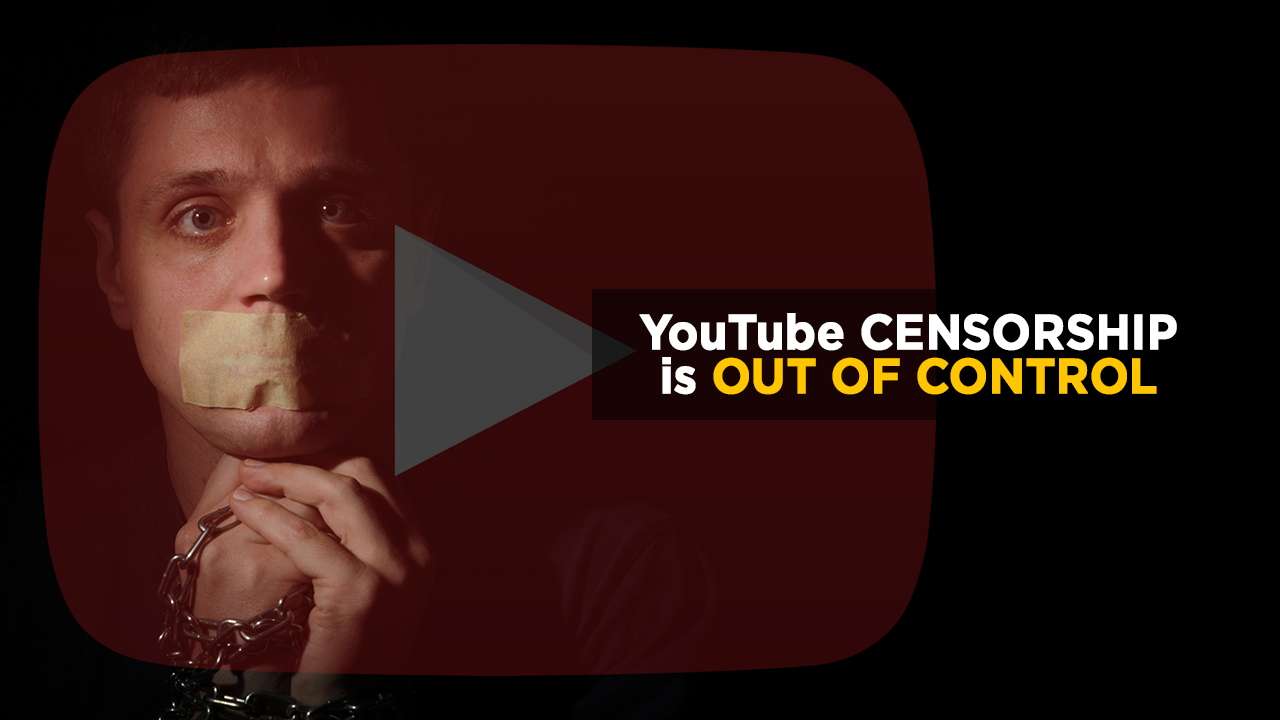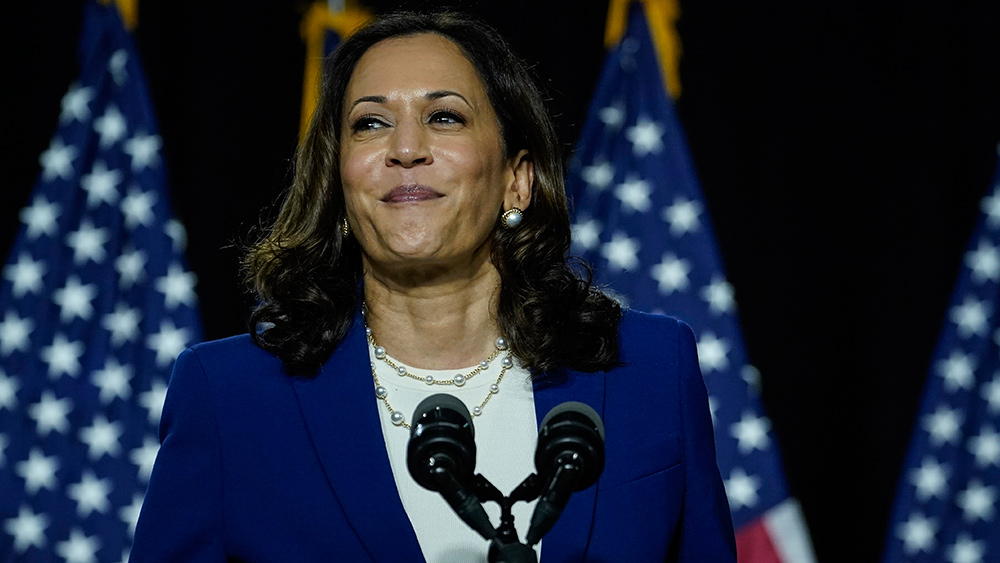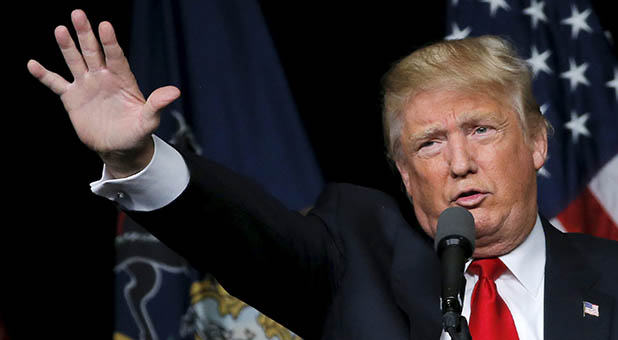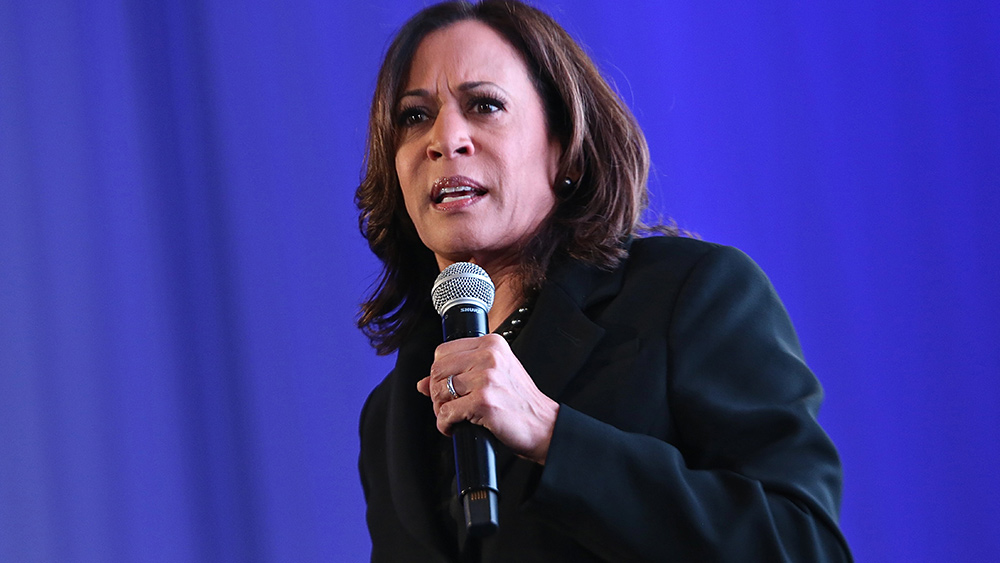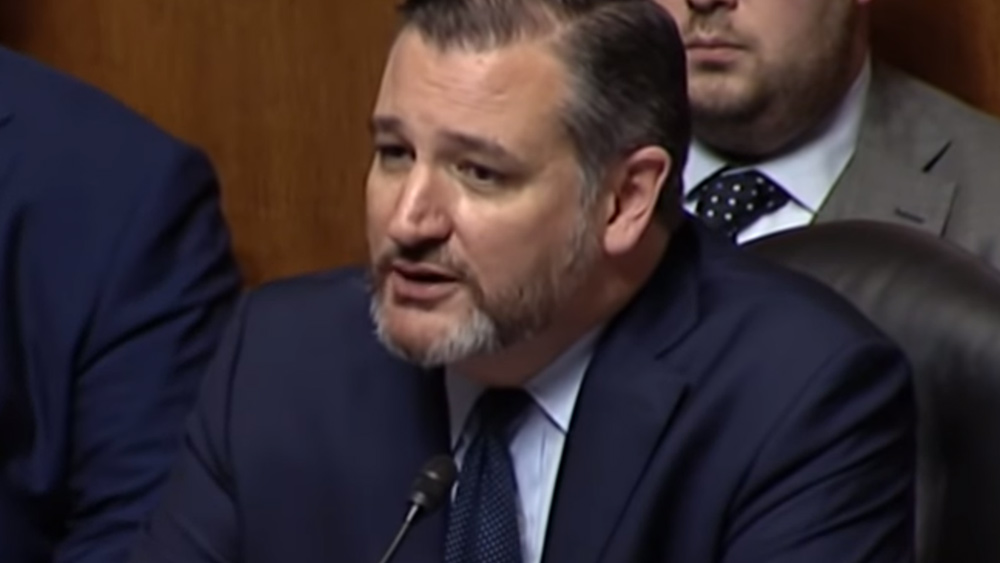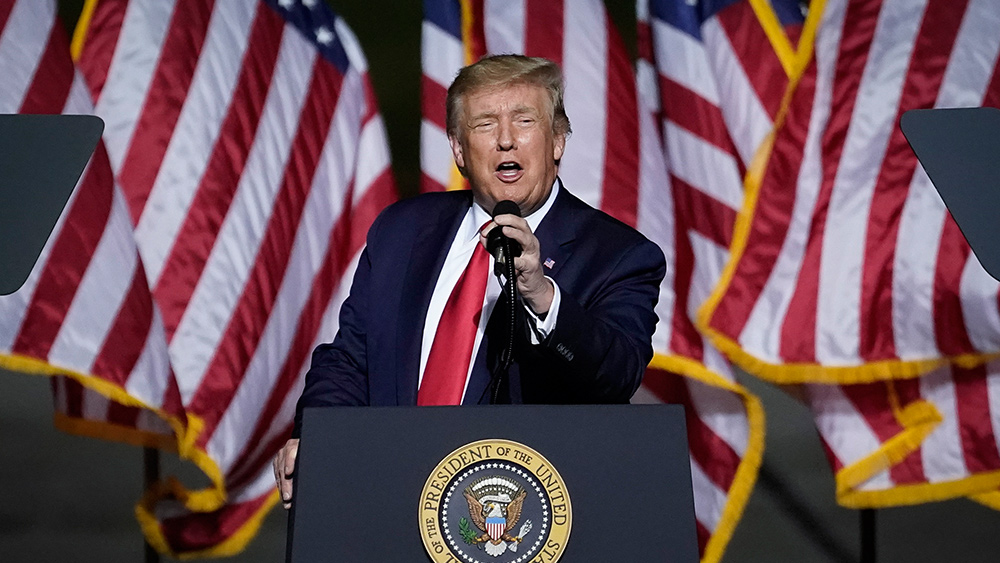Glenn Greenwald: Facebook and Twitter cross a line far more dangerous than what they censor
10/20/2020 / By News Editors

THE NEW YORK POST IS one of the country’s oldest and largest newspapers. Founded in 1801 by Alexander Hamilton, only three U.S. newspapers are more widely circulated. Ever since it was purchased in 1976 by media mogul Rupert Murdoch, it has been known — like most Murdoch-owned papers — for right-wing tabloid sensationalism, albeit one that has some real reporters and editors and is capable of reliable journalism.
(Article by Glenn Greenwald republished from TheIntercept.com)
On Wednesday morning, the paper published on its cover what it heralded as a “blockbuster” scoop: “smoking gun” evidence, in its words, in the form of emails purportedly showing that Joe Biden’s son, Hunter, traded on his father’s position by securing favors from the then-vice president to benefit the Ukranian energy company Burisma, which paid the supremely unqualified Hunter $50,000 each month to sit on its Board. While the Biden campaign denies that any such meetings or favors ever occurred, neither the campaign nor Hunter, at least as of now, has denied the authenticity of the emails.
The Post’s hyping of the story as some cataclysmic bombshell was overblown. While these emails, if authenticated, provide some new details and corroboration, the broad outlines of this story have long been known: Hunter was paid a very large monthly sum by Burisma at the same time that his father was quite active in using the force of the U.S. Government to influence Ukraine’s internal affairs.
Along with emails relating to Burisma, the New York Post also gratuitously published several photographs of Hunter, who has spoken openly and commendably of his past struggles with substance abuse, in what appeared to various states of drug use. There was no conceivable public interest in publishing those, and every reason not to.
The Post’s explanation of how these documents were obtained is bizarre at best: They claim that Hunter Biden indefinitely left his laptop containing the emails at a repair store, and the store’s owner, alarmed by the corruption they revealed, gave the materials from the hard drive to the FBI and then to Rudy Giuliani.
While there is no proof that Biden followed through on any of Hunter’s promises to Burisma, there is no reason, at least thus far, to doubt that the emails are genuine. And if they are genuine, they at least add to what is undeniably a relevant and newsworthy story involving influence-peddling relating to Hunter Biden’s work in Ukraine and his trading on the name and power of his father, now the front-runner in the 2020 presidential election.
BUT THE POST, for all its longevity, power and influence, ran smack into two entities far more powerful than it: Facebook and Twitter. Almost immediately upon publication, pro-Biden journalists created a climate of extreme hostility and suppression toward the Post story, making clear that any journalist even mentioning it would be roundly attacked. For the crime of simply noting the story on Twitter (while pointing out its flaws), New York Times reporter Maggie Haberman was instantly vilified to the point where her name, along with the phrase “MAGA Haberman,” were trending on Twitter.
(That Haberman is a crypto-Trump supporter is preposterous for so many reasons, including the fact that she is responsible for countless front-page Times stories that reflect negatively on the president; moreover, the 2016 Clinton campaign considered Haberman one of their most favorable reporters).
The two Silicon Valley giants saw that hostile climate and reacted. Just two hours after the story was online, Facebook intervened. The company dispatched a life-long Democratic Party operative who now works for Facebook — Andy Stone, previously a communications operative for Democratic Sen. Barbara Boxer and the Democratic Congressional Campaign Committee, among other D.C. Democratic jobs — to announce that Facebook was “reducing [the article’s] distribution on our platform”: in other words, tinkering with its own algorithms to suppress the ability of users to discuss or share the news article. The long-time Democratic Party official did not try to hide his contempt for the article, beginning his censorship announcement by snidely noting: “I will intentionally not link to the New York Post.”
Twitter’s suppression efforts went far beyond Facebook’s. They banned entirely all users’ ability to share the Post article — not just on their public timeline but even using the platform’s private Direct Messaging feature.
Early in the day, users who attempted to link to the New York Post story either publicly or privately received a cryptic message rejecting the attempt as an “error.” Later in the afternoon, Twitter changed the message, advising users that they could not post that link because the company judged its contents to be “potentially harmful.”
Wow. twitter going even further than FB and is no longer letting ppl tweet the NYPost story. This is what pops up if you try. https://t.co/YVlOTeF1iX pic.twitter.com/66kzYdwq21
— Alex Thompson (@AlxThomp) October 14, 2020
Even more astonishing still, Twitter locked the account of the New York Post, banning the paper from posting any content all day and, evidently, into Thursday morning. The last tweet from the paper was posted at roughly 2:00 p.m. ET on Wednesday.
And then, on Thursday morning, the Post published a follow-up article using the same archive of materials, this one purporting to detail efforts by the former vice president’s son to pursue lucrative deals with a Chinese energy company by using his father’s name. Twitter is now also banning the sharing or posting of links to that article as well.
In sum, the two Silicon Valley giants, with little explanation, united to prevent the sharing and dissemination of this article. As Los Angeles Times reporter Matt Pearce put it, “Facebook limiting distribution is a bit like if a company that owned newspaper delivery trucks decided not to drive because it didn’t like a story. Does a truck company edit the newspaper? It does now, apparently.”
THAT THE FIRST AMENDMENT RIGHT of free speech is inapplicable to these questions goes without saying. That constitutional guarantee restricts the actions of governments, not private corporations such as Facebook and Twitter.
But glibly pointing this out does not come close to resolving this controversy. That actions by gigantic corporations are constitutional does not mean that they are benign.
State censorship is not the only kind of censorship. Private-sector repression of speech and thought, particularly in the internet era, can be as dangerous and consequential. Imagine, for instance, if these two Silicon Valley giants united with Google to declare: henceforth we will ban all content that is critical of President Trump and/or the Republican Party, but will actively promote criticisms of Joe Biden and the Democrats.
Would anyone encounter difficultly understanding why such a decree would constitute dangerous corporate censorship? Would Democrats respond to such a policy by simply shrugging it off on the radical libertarian ground that private corporations have the right to do whatever they want? To ask that question is to answer it.
To begin with, Twitter and particularly Facebook are no ordinary companies. Facebook, as the owner not just of its massive social media platform but also other key communication services it has gobbled up such as Instagram and WhatsApp, is one of the most powerful companies ever to exist, if not the most powerful. In June, the House Judiciary Subcommittee on Antitrust, Commercial, and Administrative Law launched an investigation into the consolidated power of Facebook and three other companies — Google, Amazon and Apple — and just last week issued a sweeping report which, as Ars Technica explained, found:
Facebook outright “has monopoly power in the market for social networking,” and that power is “firmly entrenched and unlikely to be eroded by competitive pressure” from anyone at all due to “high entry barriers—including strong network effects, high switching costs, and Facebook’s significant data advantage—that discourage direct competition by other firms to offer new products and services.”
In his New York Times op-ed last October, the left-wing expert on monopoly power Matt Stoller described Facebook and Google as “global monopolies sitting astride public discourse,” and recounted how bipartisan policy and legal changes designed to whittle away antitrust protections have bestowed the two tech giants with “a radical centralization of power over the flow of information.” And he warns that this unprecedented consolidation of control over our discourse is close to triggering “the collapse of journalism and democracy.”
It has been astonishing to watch Democrats over the last twenty-four hours justify this censorship on the grounds that private corporations are entitled to do whatever they want. Not even radical free-market libertarians espouse such a pro-corporate view. Even the most ardent capitalist recognizes that companies that wield monopoly or quasi-monopoly power have an obligation to act in the public interest, and are answerable to the public regarding whether they are doing so.
That is why in both the EU and increasingly the U.S., there are calls from across the political spectrum to either break up Facebook on antitrust and monopoly grounds or regulate it as a public utility, the way electric and water companies and AT&T have been. Almost nobody in the democratic world believes that Facebook is just some ordinary company that should be permitted to exercise unfettered power and act without constraints of any kind. Indeed, Facebook’s monumental political and economic power — greater than most if not all the governments of nation-states — is the major impediment to such reforms.
Beyond that, both Facebook and Twitter receive substantial, unique legal benefits from federal law, further negating the claim that they are free to do whatever they want as private companies. Just as is true of Major League Baseball — which is subject to regulation by Congress as a result of the antitrust exemption they enjoy under the law — these social media companies receive a very valuable and particularized legal benefit in the form of Section 230 of the Communications Decency Act, which shields them from any liability for content published on their platforms, including defamatory material or other legally proscribed communications.
No company can claim such massive, unique legal exemptions from the federal law and then simultaneously claim they owe no duties to the public interest and are not answerable to anyone. To advocate that is a form of authoritarian corporatism: simultaneously allowing tech giants to claim legally conferred privileges and exemptions while insisting that they can act without constraints of any kind.
Then there is the practical impact of Twitter and Facebook uniting to block content published by a major newspaper. It is true in theory that one can still read the suppressed article by visiting the New York Post website directly, but the stranglehold that these companies exert over our discourse is so dominant that their censorship amounts to effective suppression of the reporting.
In 2018, Pew Research found that “about two-thirds of U.S. adults (68%) get news on social media sites. One-in-five get news there often.“ The combination of Facebook, Google and Twitter controls the information received by huge numbers of Americans, Pew found. “Facebook is still far and away the site Americans most commonly use for news. About four-in-ten Americans (43%) get news on Facebook. The next most commonly used site for news is YouTube [owned by Google], with 21% getting news there, followed by Twitter at 12%.”
While Twitter still falls short of Facebook in terms of number of users, a 2019 report found that “Twitter remains the leading social network among journalists at 83%.” Censoring a story from Twitter thus has disproportionate impact by hiding it from the people who determine and shape the news.
THE GRAVE DANGERS posed by the censorship actions of yesterday should be self-evident. Just over two weeks before a presidential election, Silicon Valley giants — whose industry leaders and workforce overwhelmingly favor the Democratic candidate — took extraordinary steps to block millions, perhaps tens of millions, of American voters from being exposed to what purports to be a major exposé by one of the country’s oldest and largest newspapers.
As the New York Times put it in an article in March about the political preferences of tech leaders: “Silicon Valley has long leaned blue.” Large numbers of tech executives, including Facebook’s second-in-command Sheryl Sandberg, were also vocally supportive of Hillary Clinton in 2016. At the very least, the perception, if not the reality, has been created that these tech giants are using their unprecedented power over political and election-related information to prevent the dissemination of negative reporting about the presidential candidate they favor. Whatever that is, it is not democratic or something to cheer.
The rationale offered by both Twitter and Facebook to justify this censorship makes it more alarming, not less. Twitter claimed that the Post article violates its so-called “Hacked Materials Policy,” which it says permits “commentary on or discussion about hacked materials, such as articles that cover them but do not include or link to the materials themselves”; in other words, Twitter allows links to articles about hacked materials but bans “links to or images of hacked material themselves.”
The company added that their policy “prohibits the use of our service to distribute content obtained without authorization” because, they said, they “don’t want to incentivize hacking by allowing Twitter to be used as distribution for possibly illegally obtained materials.”
But that standard, if taken seriously and applied consistently, would result in the banning from the platform of huge amounts of the most important and consequential journalism. After all, a large bulk of journalism is enabled by sources providing “content obtained without authorization” to journalists, who then publish it.
Indeed, many of the most celebrated and significant stories of the last several decades — the Pentagon Papers, the WikiLeaks’ Collateral Murder video and war logs, the Snowden reporting, the Panama Papers, the exposés from the Brazil Archive we reported over the last year — relied upon publication of various forms of “hacked materials” provided by sources. The same is true of the DNC and Podesta emails that exposed corruption and forced the 2016 resignation of the top five officials of the Democratic National Committee.
Does anyone think it would be justifiable or politically healthy for tech giants to bar access to those documents of historic importance in journalism and politics? That is what the Twitter policy, taken on its face, would require.
For that matter, why is Twitter not blocking access to the ongoing New York Times articles that disclose the contents of President Trump’s tax returns, the unauthorized disclosure of which is a crime? Why did those platforms not block links to the now-notorious Rachel Maddow segment where she revealed details about one of Trump’s old tax returns on the ground that it was “content obtained without authorization”? Or what about the virtually daily articles in the New York Times, Washington Post, NBC News and others that explicitly state they are publishing information that the source is unauthorized to disclose: how does that not fall squarely within the banning policy as Twitter defined it yesterday?
Worse still, why does Twitter’s “hacking” policy apply to the New York Post story at all? While the Post’s claims about how these emails were obtained are dubious at best, there is no evidence — unlike the award-winning journalism scoops referenced above — that they were obtained by virtue of “hacking” by a source.
Facebook’s rationale for suppression — that it needs to have its “fact checking” partners verify the story before allowing it to be spread — poses different but equally alarming dangers. What makes Mark Zuckerberg’s social media company competent to “fact check” the work of other journalists? Why did Facebook block none of the endless orgy of Russiagate conspiracy theories from major media outlets that were completely unproven if not outright false?
Do we really want Facebook serving as some sort of uber-editor for U.S. media and journalism, deciding what information is suitable for the American public to read and which should be hidden from it after teams of journalists and editors at real media outlets have approved its publication? And can anyone claim that Facebook’s alleged “fact-checking” process is applied with any remote consistency given how often they failed to suppress sketchily sourced or facially unreliable stories — such as, say, the Steele Dossier and endless articles based on it? Can you even envision the day when an unproven conspiracy theory — leaked by the CIA or FBI to the Washington Post or NBC News — is suppressed pending “fact-checking” by Facebook?
Twitter is not opposed to hacked materials and Facebook is not opposed to dubiously sourced stories. They are opposed to such things only when such stories anger powerful factions. When those power centers are the ones disseminating such stories, they will continue to have free rein to do so.
THE GLARING FALLACY that always lies at the heart of pro-censorship sentiments is the gullible, delusional belief that censorship powers will be deployed only to suppress views one dislikes, but never one’s own views. The most cursory review of history, and the most minimal understanding of how these tech giants function, instantly reveals the folly of that pipe dream.
Facebook is not some benevolent, kind, compassionate parent or a subversive, radical actor who is going to police our discourse in order to protect the weak and marginalized or serve as a noble check on mischief by the powerful. They are almost always going to do exactly the opposite: protect the powerful from those who seek to undermine elite institutions and reject their orthodoxies.
Tech giants, like all corporations, are required by law to have one overriding objective: maximizing shareholder value. They are always going to use their power to appease those they perceive wield the greatest political and economic power.
That is why Facebook accepts virtually every request from the Israeli Government to remove the pages of Palestinian journalists and activists on the grounds of “incitement,” but almost never accepts Palestinians’ requests to remove Israeli content. It is the same reason Facebook blocks and censors governments adverse to the U.S., but not the other way around. They are going to heed the interests of the powerful at the expense of those who lack it. It is utter madness to want to augment their censorship powers or to expect they will use it for any other ends.
Facebook and Twitter have in the past censored the content or removed the accounts of far-right voices. They have done the same to left-wing voices. That is always how it will work: it is exclusively the voices on the fringes and the margins, the dissidents, those who reside outside of the factions of power who will be subjected to this silencing. Mainstream political and media voices, and the U.S. Government and its allies, will be fully free to spread conspiracy theories and disinformation without ever being subjected to these illusory “rules.”
Censorship power, like the tech giants who now wield it, is an instrument of status quo preservation. The promise of the internet from the start was that it would be a tool of liberation, of egalitarianism, by permitting those without money and power to compete on fair terms in the information war with the most powerful governments and corporations.
But just as is true of allowing the internet to be converted into a tool of coercion and mass surveillance, nothing guts that promise, that potential, like empowering corporate overlords and unaccountable monopolists to regulate and suppress what can be heard.
To observe that those who are cheering for this today because they happen to like this particular outcome are being short-sighted and myopic is to woefully understate the case. The only people who should want to live in a world where Mark Zuckerberg and Sundar Pichai and Jeff Bezos have a stranglehold on what can be said and heard are those whose actions are devoted to the perpetuation of their power and who benefit from their hegemony.
Everyone else will eventually be faced with the choice of conformity or censorship, of refraining from expressing prohibited views as the cost for maintaining access to crucial social media platforms. The only thing more authoritarian than the acts of Facebook and Twitter yesterday is the mentality that causes ordinary people to cheer it, to be grateful for the power and control they have long wielded and yesterday finally unleashed.
Update: Oct. 16, 2020, 6:18 a.m. ET
Late Thursday evening, Twitter announced changes to its ”Hacked Materials Policy” designed to address concerns that its policy as stated — and as applied to the Post articles — would result in the banning of crucial reporting based on hacked materials or other “unauthorized” disclosures. Explained by Vijaya Gadde, a top Twitter executive, the new rules now provide that Twitter’s policy applies not to articles by news outlets reporting on hacked materials but only in those cases when the hacked material “is directly shared by hackers or those acting in concert with them.” Additionally, going forward, Twitter “will label Tweets to provide context instead of blocking links from being shared.” Gadde said specifically that the changes are intended “to address the concerns that there could be many unintended consequences to journalists, whistleblowers and others in ways that are contrary to Twitter’s purpose of serving the public conversation.”
There are still serious concerns about what Twitter did in this particular case and how these rules will be applied to future cases, but these changes are a commendably responsive effort to minimize the dangers of this policy and alleviate the concerns raised by journalists and transparency advocates.
Read more at: TheIntercept.com
Tagged Under: banned, bit tech, Censorship, conspiracy, corruption, evil, Facebook, fascism, free speech, left cult, mainstream media, Orwellian, politics, Social media, speech police, tech giants, techno tyranny, thought police, Twisted, Twitter
RECENT NEWS & ARTICLES
COPYRIGHT © 2018 THOUGHTCRIMES.NEWS
All content posted on this site is protected under Free Speech. ThoughtCrimes.news is not responsible for content written by contributing authors. The information on this site is provided for educational and entertainment purposes only. It is not intended as a substitute for professional advice of any kind. ThoughtCrimes.news assumes no responsibility for the use or misuse of this material. All trademarks, registered trademarks and service marks mentioned on this site are the property of their respective owners.


